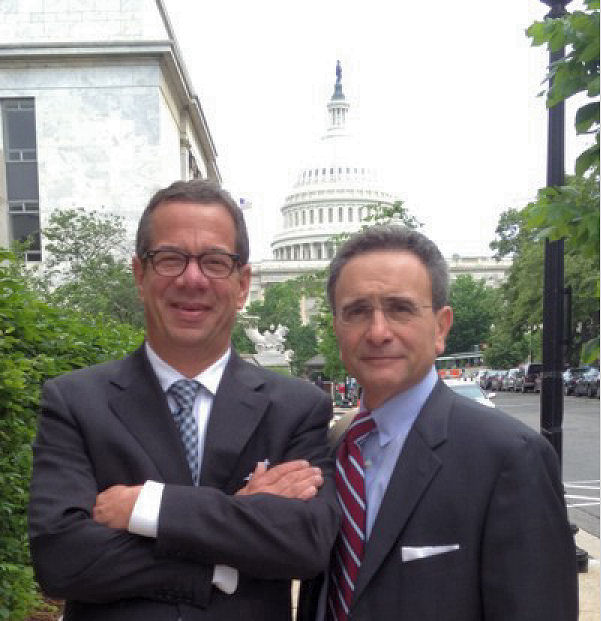| The Trusted Adviser |
March 2016 | Volume 9 · Number 3
|
Keeping Lawyers at the Closing Table
Why it's Vital for Consumer Protection
Guest Author:
Frank Pellegrini - President of Prairie Title, Agent of ATG
 Dear Colleagues:
Dear Colleagues:
In each of my two face-to-face meetings with Consumer Financial Protection Bureau (CFPB) Director, Richard Cordray, in his Washington, D.C., office, I emphatically stated my belief that the best consumer protection mechanism in a residential real estate transaction is provided by the involvement of attorneys for the parties. My instincts tell me that, in his heart, he agrees.
However, Director Cordray is aware that consumers in many parts of the United States are not encouraged to seek the counsel of an attorney. By custom and practice in most regions of the country, the real estate transaction is "driven" by the Realtor® or other real estate professional. The result is a void in consumer protection, which agencies like the Consumer Financial Protection Bureau are created to fill.

ATG President Peter Birnbaum (left) with Frank Pellegrini (then President of ALTA) on an advocacy mission to Washington, D.C., in 2012.
|
The presumptive role of the real estate lawyer to vigorously, independently, and conscientiously advocate for the best interests of our clients is being insidiously undermined by the proliferation of affiliates owned and operated by Realtors or other real estate brokers and agents. In the Chicago market the inexorable erosion of our role as advocate and protectors of our clients' interests is occurring through unwritten understandings that require referrals of title orders by attorneys to Realtor title affiliates in exchange for continued referrals of clients to attorneys by those same Realtors. These arrangements are made even more troublesome by the existence of attorney-agent programs that implicatethe participants as knowledgeable accomplices in activities that clearly limit consumer choice and cloud the independent judgment of the lawyer.
The purpose of this message is to create a level of urgent concern in your minds. I believe a day of reckoning for these arrangements may be near and I want to share with you my reasons to suggest that you resist becoming involved with them.
RESPA Violations
Section 8 of the Real Estate Settlement and Procedures Act (RESPA 12 U.S. Code §1207) reads as follows:
"(a) Business referrals
No person shall give and no person shall accept any fee, kickback, or thing of value pursuant to any agreement or understanding, oral or otherwise, that business incident to or a part of a real estate settlement service involving a federally related mortgage loan shall be referred to any person."
I am certain no one would argue that the referral of a client would not constitute a "thing of value."
It used to be that there was not much to be concerned about because RESPA enforcement previously was the responsibility of the Department of Housing and Urban Development (HUD). The "HUD Police" had for years been regarded as something of a joke. This is no longer the case. The Dodd-Frank Wall Street Reform and Consumer Protection Act of 2010 created the CFPB and transferred enforcement of RESPA to the CFPB.
The CFPB "police" are no laughing matter. The CFPB has the resources of the Federal Reserve and the fruits of its own enforcement activities to fuel it, all without necessity of Congressional appropriations. Its current operations are supported to the tune of approximately $600,000,000. There are more than 150 enforcement officers (mostly lawyers). Further, although penalties under RESPA remain unchanged, Dodd-Frank enacted its own penalties which range from $5,000 per day per negligent violation to $25,000 per day per reckless violation and all the way to $1,000,000 per day per knowing violation.
The CFPB has not been shy about asserting its muscle, either. Since its formation in 2011, the Bureau has brought several dozen enforcement actions based upon RESPA violations. Consent decrees have been secured from banks, mortgage lenders, real estate brokerages, title companies, builders and others in real estate commerce. Proceedings have also been brought against lawyers. It is important to keep in mind that title companies, real estate professionals, and lawyers were all carved out of the language of the Dodd-Frank Act. So, how is it that all this pain can be inflicted upon companies and individuals that presumably fall outside of its enforcement jurisdiction? The answer lies in three sections of the Dodd-Frank Act:
§1031: Provides for enforcement against not only "covered persons", but also service providers engaging in unfair, deceptive, or abusive acts or practices in connection with consumer financial products or services.
§1036: Brings aiders and abettors into net of enforcement; i. e., any person who knowingly or recklessly provides substantial assistance to covered persons in violation of Section 1031.
§1056: Provides for referrals for criminal prosecution to the United States Attorney General.
Real estate lawyers must be mindful that any arrangements that could be viewed as detrimental to consumer protection carry very significant consequences.
The Word is Out about the Chicago Market
Members of Congress and the CFPB are aware of prevalent practices in our corner of the world. Investigations, inquiries, and other official activities cannot be ruled out and should not be ignored.
The Minnesota Experience
Not that many years ago, the Minneapolis/St. Paul market looked quite similar to that which we enjoy in Chicago. However, through persistence and aggressive marketing of Realtors for their affiliated business arrangements coupled with complacency among residential real estate lawyers, it is extremely rare to find an attorney for a buyer or a seller at the closing table anymore. Essentially, lawyers ceded their place at the table.
ISBA Ethics Opinion 10-02.
"A lawyer may not enter into a referral arrangement with a real estate company that would require the lawyer to use the real estate company's affiliated title insurer for the lawyer's clients as a condition of receiving referrals from the real estate company."
More reasons:
- Consumer choice is restricted through these arrangements.
- Proper disclosures may be lacking.
You May be Skeptical
I may sound a bit like Chicken Little, insisting that the sky is falling. Some of you may also regard this as somewhat self-serving in light of the fact that my company competes directly with the affiliated businesses I refer to. That is understandable. But, please know that it is not my goal or intent to be overly dramatic or to be an alarmist. Also, be assured that my motives are greater than protecting my tiny corner of the title and settlement market. I am most passionate about preserving the crucial role of real estate attorneys. We cannot stress enough that for most Americans the largest investment of their wealth is in their home; they deserve the protection of their own attorney in any transaction involving that home.
Stay Informed
If you still suspect that I may be overstating the case, I encourage you to subscribe, as I do, to the CFPB Newsroom RSS feed. It is free. I also frequently visit the blogs of KL Gates and Ballard Spahr. They are two notable law firms heavily steeped in federal financial compliance and CFPB enforcement matters. Ballard Spahr maintains a site called the CFPB Monitor, which is easy to navigate. The CFPB website is also easy to navigate and enforcement cases going back to its inception can be found there.
Let's Not Cede Our Place at the Table!
I would love to hear from you directly and I would be happy to share specifics on what I have outlined here. Do not hesitate to call me.
Respectfully,
Frank Pellegrini
President & CEO
Prairie Title
6821 North Avenue
Oak Park, IL 60302
708.386.7900
www.prairietitle.com
About the Author
Frank Pellegrini is Chief Executive Officer of Prairie Title, Oak Park, Illinois. He is also the immediate past president of the American Land Title Association (ALTA). Frank has been in the title insurance business since 1978 and has been a practicing lawyer in Illinois since 1976. Frank has maintained his law practice while growing Prairie Title. The law firm concentrates on transactional matters with an emphasis in all aspects of real estate law. Conducting an active law practice while running the title company gives him a view from all sides of the real estate transaction. This perspective includes contractual issues, real estate brokerage issues, disclosure and mortgage lending concerns. The dovetailing of a hands-on law practice with title and escrow operations serves to enhance the breadth of experience, which he is able to bring to the service of the title company's clients.
[Last update: 3-22-16]
Print this page
 Contact Us
Contact Us HelpDesk
HelpDesk Email Us
Email Us